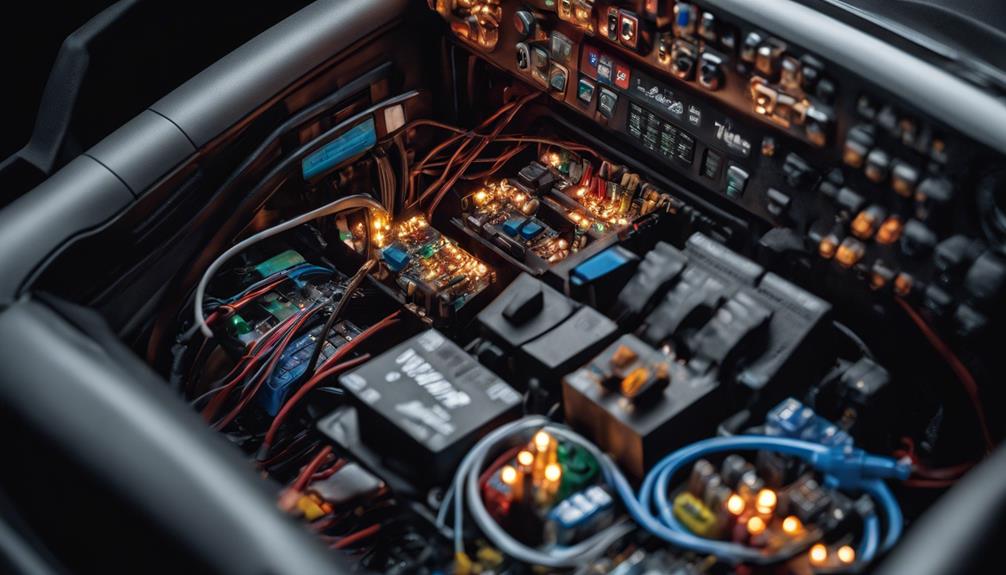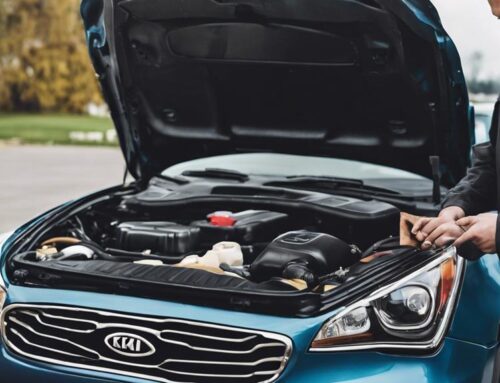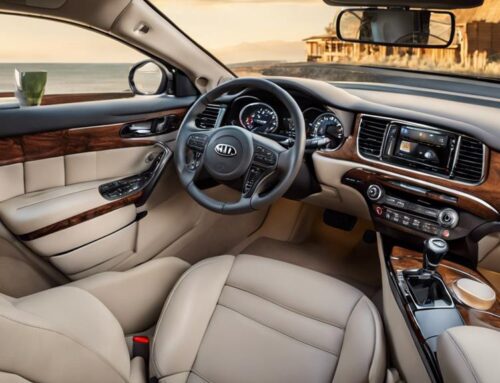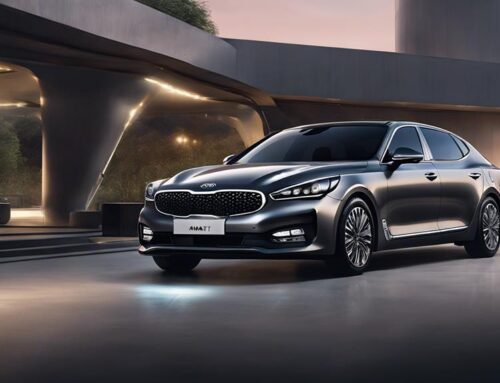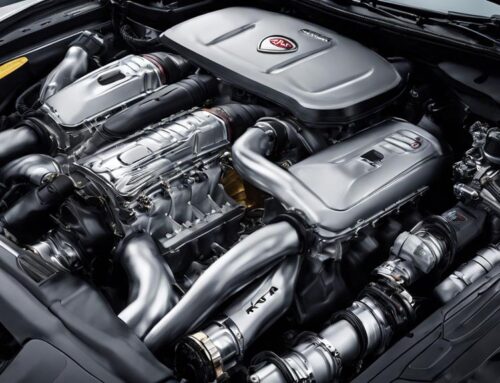For your Nissan Titan, Low Rate Locksmith offers high-quality electrical components to maintain peak performance. The electrical system in your Titan, including the alternator, voltage regulator, and circuit protection, guarantees seamless signal transmission and circuit safety. Whether you're dealing with faulty wiring or a malfunctioning alternator, addressing these issues promptly is crucial. Regular battery maintenance, consistent inspection of wiring connections, and the use of OBD-II scanners for diagnostics further enhance reliability. By staying on top of these details, you're ensuring top-notch functionality. Discover more about essential upgrades and troubleshooting tips to keep your Titan running smoothly.
Key Takeaways
- The electrical system in the Nissan Titan manages ignition, infotainment, and critical functions through regulated voltage and circuit protection.
- Key electrical components include the alternator, voltage regulator, ECU, fuses, and relays for optimal performance and safety.
- Remote start, keyless entry, and security systems rely on encrypted signals and proximity sensors integrated with the electrical system.
- Regular maintenance of the battery, wiring, and electrical connections ensures efficient operation and prevents malfunctions.
- Diagnosing electrical issues involves checking alternator output, battery voltage, fuses, wiring integrity, and using an OBD-II scanner for trouble codes.
Overview of Electrical Systems in Nissan Titan
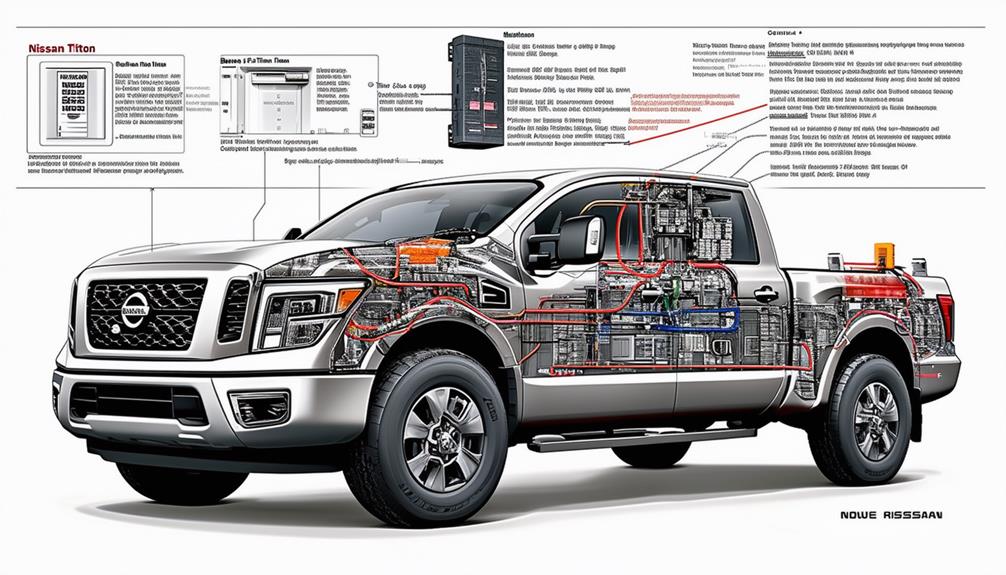
The electrical system in the Nissan Titan is the backbone of its functionality, guaranteeing everything from ignition to advanced infotainment operates seamlessly. In this advanced automotive marvel, voltage regulation and circuit protection play pivotal roles in maintaining peak performance and safety. This is similar to the sophisticated technologies that enhance the overall safety of the Titan, securing reliability across various systems.
Voltage regulation is critical for the Titan's electrical system. It secures that the voltage levels supplied to various components remain within specified limits, preventing overvoltage and undervoltage conditions. The Titan's alternator, equipped with a voltage regulator, dynamically adjusts the output to match the vehicle's electrical load. This is particularly essential when you consider the array of power-hungry devices, from headlights to the infotainment system, demanding consistent and reliable power.
Circuit protection is another cornerstone of the Titan's electrical integrity. The system incorporates a range of protective devices, including fuses, circuit breakers, and relays.
Fuses, strategically placed throughout the vehicle, act as sacrificial devices that break the circuit if the current exceeds safe levels, hence preventing potential damage to critical components. Circuit breakers provide re-settable protection, automatically interrupting and then resetting the flow of electricity when necessary. This dual-layer approach ensures that any electrical faults are contained and don't compromise the overall system.
Key System Integration with Electrical Components
Understanding the importance of voltage regulation and circuit protection lays the foundation for exploring how these electrical components seamlessly integrate with the Titan's key systems. The Nissan Titan's advanced key system integration involves sophisticated electrical components that ensure dependable and secure vehicle access. Two standout features you'll appreciate are remote start and keyless entry, both of which rely on precision electronic engineering.
Incorporating remote start functionality requires a strong communication link between the key fob and the vehicle's control systems. This link depends on encrypted signals transmitted via radio frequency, guaranteeing that only the authorized key fob can activate the ignition. The Titan's electrical architecture must manage these signals effectively, maintaining voltage stability to prevent signal degradation.
Keyless entry utilizes similar technology but adds layers of convenience and security. Proximity sensors detect the key fob when it approaches the vehicle, triggering the central locking system. These sensors depend on the accurate calibration of electrical components, ensuring they only respond to the correct signals.
Here's a breakdown of how these systems integrate:
| Component | Functionality |
|---|---|
| Key Fob | Transmits encrypted signals for remote start and keyless entry. |
| Proximity Sensor | Detects the key fob's presence to access doors. |
| ECU (Engine Control Unit) | Manages ignition and communication protocols. |
| Voltage Regulator | Maintains steady voltage levels for reliable signal transmission. |
| Circuit Protection | Prevents electrical surges that could harm key system components. |
Common Electrical Issues and Fixes
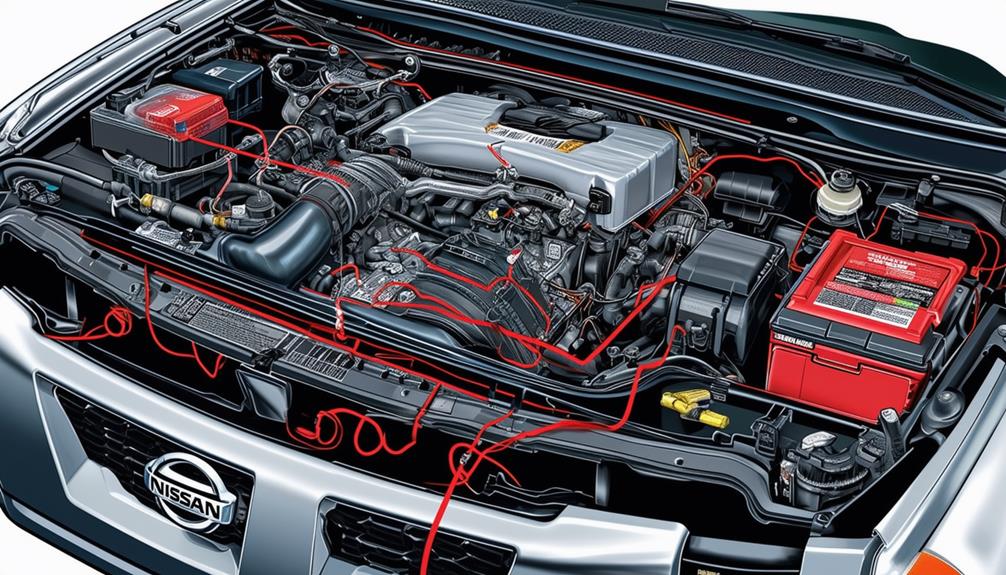
Encountering electrical issues in your Nissan Titan can be frustrating, but understanding common problems and their fixes can save time and money. One prevalent issue is a malfunctioning alternator, which can lead to your vehicle's battery not charging properly. To troubleshoot this, use a multimeter to check the voltage at the battery terminals when the engine is running. A healthy alternator should output between 13.5 and 14.5 volts. If it's beyond this range, replacing the alternator is often the solution.
Another common problem is faulty wiring connections, often caused by corrosion or wear and tear. Inspect the wiring harnesses for any visible signs of damage or corrosion. Applying dielectric grease to connectors can improve conductivity and prevent future corrosion, a vital aspect of preventative maintenance. For more detailed advice, consider exploring troubleshooting advice that focuses on push-to-start technology.
Flickering or dimming headlights can indicate issues with the voltage regulator. You can test the voltage regulator's performance by measuring the voltage at the battery while turning on various electrical components. If the readings fluctuate significantly, the voltage regulator might need replacement.
Blown fuses are another frequent issue. Always check the fuse box for any blown fuses if you experience electrical failures. Replacing a blown fuse is straightforward, but it's essential to identify the underlying cause to prevent recurrence. Use detailed troubleshooting techniques such as tracing the circuit to locate any short circuits or component failures.
Lastly, issues with the ignition switch can prevent your Titan from starting. Test the ignition switch by checking for continuity in the various switch positions using a multimeter. If inconsistencies are found, replacing the ignition switch is necessary.
Battery Role in Key System Functionality
While addressing common electrical issues can keep your Nissan Titan running smoothly, let's focus on the battery's role in key system functionality. Your vehicle's battery isn't just for starting the engine; it powers essential systems like the ignition, ECU, and keyless entry. Without a well-maintained battery, you risk system malfunctions that could leave you stranded.
Battery maintenance isn't just about checking the charge. Proper care involves regular inspections for corrosion on terminals, ensuring secure connections, and monitoring the battery's health using a multimeter. These steps can preempt potential issues before they escalate into costly repairs.
Below is a table summarizing key battery maintenance tasks and their impact on your Nissan Titan's key system functionality:
| Task | Description | Impact on Key System Functionality |
|---|---|---|
| Terminal Cleaning | Remove corrosion and build-up | Ensures dependable electrical connections |
| Voltage Testing | Use a multimeter to check battery charge | Prevents unexpected failures in key systems |
| Connection Inspection | Ensure all cables are tightly secured | Maintains consistent power flow to critical systems |
| Battery Replacement Schedule | Follow manufacturer guidelines for replacement | Avoids sudden power losses that can immobilize vehicle |
| Load Testing | Assess battery performance under load | Detects early signs of battery wear that could affect key systems |
Electrical troubleshooting is crucial when dealing with an intricate vehicle like the Nissan Titan. Identifying weak points in your battery's performance can save you from inconvenient breakdowns. For instance, a weak battery can lead to erratic behavior in your keyless entry system, making it difficult to access or start your vehicle.
Incorporating a rigorous battery maintenance routine ensures that your Nissan Titan's key systems remain operational and reliable. By staying proactive, you can enhance your vehicle's longevity and performance, paving the way for innovative driving experiences.
Importance of Wiring and Electrical Connections
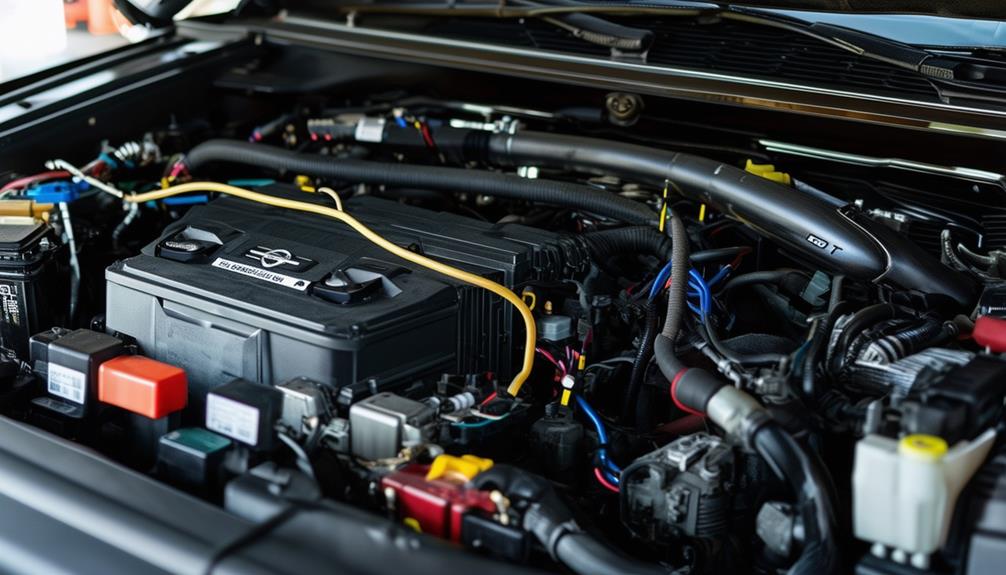
Proper wiring and electrical connections are the foundation of your Nissan Titan's electrical system. Without them, achieving precise voltage regulation is almost impossible, leading to inconsistent performance or even system failures. High-quality wiring ensures that electrical signals are transmitted efficiently to each component, maintaining peak functionality throughout the vehicle. This is particularly vital given the Titan's advanced electronics and integrated security features.
Securing wiring integrity is paramount. Each wire and connection needs to be inspected regularly for signs of wear, corrosion, or damage. A single compromised wire can result in voltage drops, leading to inefficient electrical flow and potential malfunction of critical systems like the engine control unit (ECU), lighting, and infotainment systems. By maintaining wiring integrity, you guarantee a stable and reliable voltage supply across all components, essential for the Titan's advanced electronics.
Innovative solutions in automotive electrical systems focus on enhancing the durability and performance of wiring and connections. Utilizing materials like high-conductivity copper and advanced insulation techniques can notably reduce resistance and prevent overheating. Additionally, modern connectors designed with moisture and vibration resistance can extend the lifespan of your vehicle's electrical network.
The complexity of the Nissan Titan's electrical system demands attention to detail in every connection. Proper crimping, soldering, and securing of wires prevent issues like short circuits and electromagnetic interference, which can disrupt sensitive electronic modules. Voltage regulation circuits, such as those found in the alternator and voltage regulator, rely on these secure connections to function correctly and guarantee your battery remains charged and your electrical systems operate within safe parameters.
Diagnosing Electrical Problems in Nissan Titan
Why is diagnosing electrical problems in your Nissan Titan so important? Electrical issues can greatly impact your vehicle's performance, safety, and reliability. Identifying these problems early guarantees that your Titan remains a strong and dependable machine.
Start by checking for voltage fluctuations. These can indicate underlying issues with the battery, alternator, or wiring. Use a multimeter to measure the voltage at various points in the electrical system. For instance, a drop in voltage when engaging the starter could indicate a weak battery or poor connections. Consistent voltage readings are essential for the proper functioning of all electrical components.
For more information, you can refer to troubleshooting tips specially designed for key and ignition systems.
Sensor malfunctions are another common issue that can impact your Titan's performance. Modern vehicles rely heavily on sensors to monitor and adjust various systems. If a sensor, like the oxygen sensor or mass airflow sensor, fails, it can disrupt the engine's air-fuel mixture, leading to reduced efficiency and increased emissions. Use an OBD-II scanner to pull diagnostic trouble codes (DTCs) from the vehicle's computer. These codes can direct you to the specific sensor or circuit experiencing issues.
Pay attention to any irregularities with lighting, infotainment systems, or other electronic accessories. Flickering lights or unresponsive touchscreens can indicate grounding issues or failing relays. Inspect the fuses and relays for any signs of damage or corrosion.
Maintenance Tips for Electrical Systems
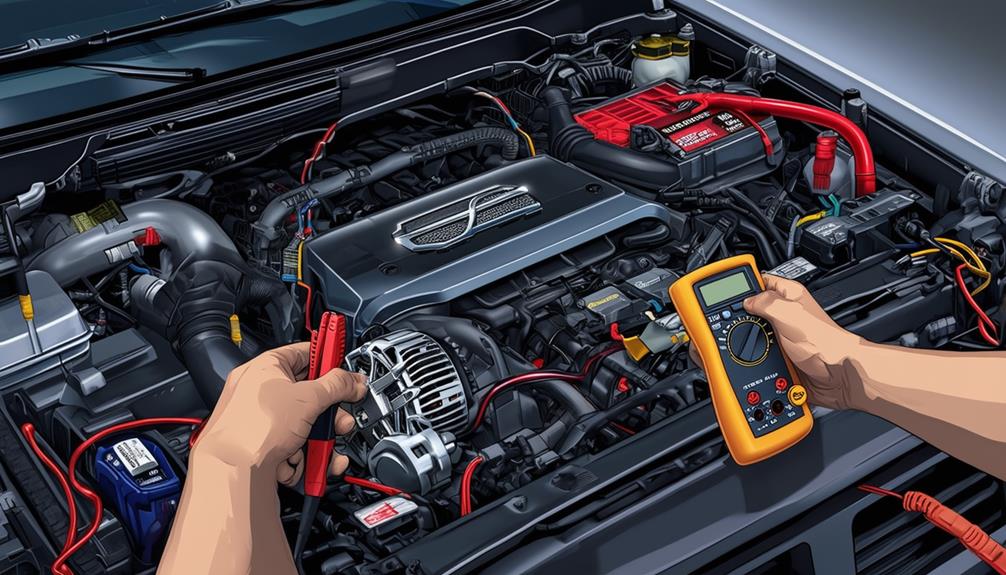
After diagnosing electrical problems in your Nissan Titan, it's important to implement proper maintenance to prevent future issues. Start with a robust preventative maintenance routine that will keep your vehicle's electrical systems in best condition.
Regularly inspect battery terminals for corrosion, as buildup can inhibit electrical flow. Clean them using a mixture of baking soda and water, ensuring a solid connection. Keeping the battery in good condition is vital because it impacts key systems and overall performance.
Ensure all wiring harnesses are securely fastened and free from wear. Inspect for signs of fraying or damage, and use electrical tape or shrink tubing to reinforce any compromised sections.
Preventative maintenance should also include checking the alternator's output voltage; it should typically range between 13.8 and 14.2 volts. Use a multimeter to confirm accurate readings and replace the alternator if necessary.
Next, focus on the fuses and relays. Remove each fuse one by one to inspect for any signs of burning or discoloration, indicative of potential electrical faults. Replace any fuses showing wear to avert unexpected failures. For relays, verify their condition by swapping them with known good ones from similar circuits.
Incorporate advanced troubleshooting techniques to detect potential issues before they escalate. For instance, use an OBD-II scanner to monitor the ECU for any fault codes related to electrical components. Regularly updating the vehicle's software can also preemptively address minor glitches that could lead to major malfunctions.
Lastly, periodically check all lighting systems, including headlights, brake lights, and indicators, ensuring they function correctly. Replace any bulbs that flicker or dim over time. By adhering to these maintenance tips, you'll enhance the longevity and reliability of your Nissan Titan's electrical systems.
Impact of Electrical Components on Security
Electrical components often play a vital role in the security systems of your Nissan Titan. These components, ranging from sensors to central processing units (CPUs), are the backbone of the vehicle's defense against theft and unauthorized access. Understanding the impact of these elements can help you identify potential security vulnerabilities and enhance your vehicle's overall protection.
One crucial aspect is the integration of electronic control units (ECUs) with the central locking system. ECUs manage various security functions, such as immobilizers and remote keyless entry, ensuring that only authorized personnel can access your Titan. If these units are compromised, there's a substantial risk of unauthorized access. Hence, regular diagnostics and updates are essential to maintaining their integrity.
Another element to ponder is the role of the vehicle's CAN (Controller Area Network) bus. This internal communication system links all electronic components and ensures seamless data transfer. When there's a breach in the CAN bus, it could lead to a cascade of security vulnerabilities, making your Titan vulnerable to various types of cyber-attacks. Implementing robust encryption and secure protocols in your CAN bus system can mitigate these risks.
Moreover, implementing electrical system upgrades can greatly enhance your vehicle's security. Advanced components such as biometric systems and enhanced GPS tracking can be integrated into your Titan, providing an additional layer of protection. These upgrades not only strengthen security but also align with the ever-changing technological landscape, offering you peace of mind and a modern driving experience.
Upgrading Electrical Systems in Titan
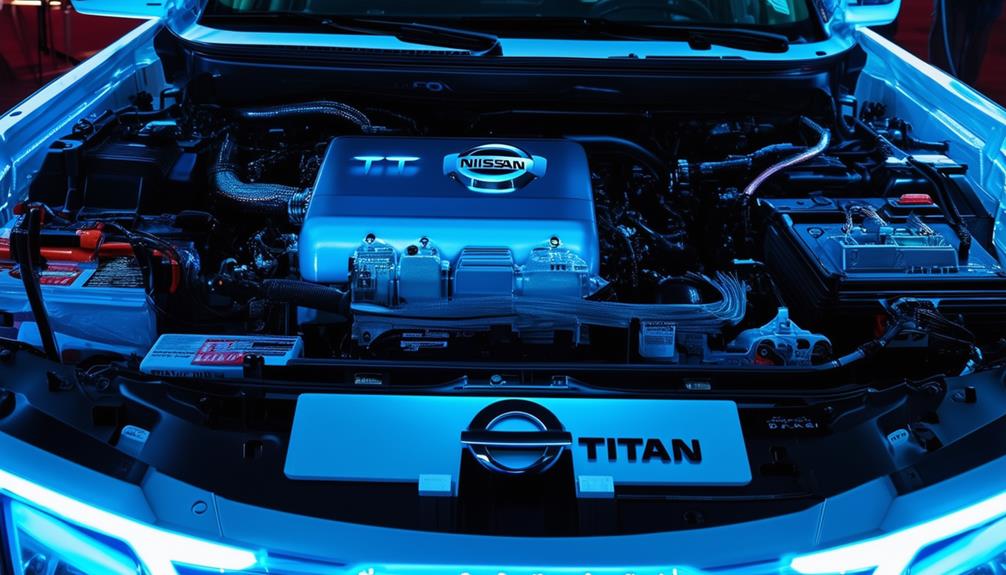
Recognizing the pivotal role electrical components play in your Nissan Titan's security, it's equally important to explore upgrading these systems to enhance overall performance and reliability. Upgrading your Titan's electrical system involves strategic enhancements in wiring upgrades and power distribution, securing your vehicle operates at peak efficiency.
Modernizing your wiring setup isn't just about replacing old wires; it involves selecting high-quality, heat-resistant materials that can handle increased power loads. This reduces the risk of electrical failures and guarantees consistent performance. Opting for professional-grade wiring upgrades can also minimize voltage drops, preventing power loss, and guaranteeing all components receive stable power.
Power distribution is another essential factor. By upgrading to advanced power distribution modules, you can better manage the electrical load across various systems. This means your Titan's lighting, infotainment, and critical security components like alarms and immobilizers, receive balanced power, reducing strain and potential malfunctions.
Here's a comparative table to illustrate the benefits of wiring upgrades and advanced power distribution:
| Aspect | Standard System | Upgraded System |
|---|---|---|
| Wiring Materials | Basic Copper | Heat-resistant Alloys |
| Voltage Stability | Moderate Fluctuations | Consistent, Minimal Drops |
| Power Distribution | Basic Distribution Box | Advanced Distribution Module |
| System Reliability | Prone to Failures | Enhanced Durability and Consistency |
Upgrading your Titan's electrical system isn't just about keeping it running; it's about pushing the boundaries of performance and reliability. With top-tier wiring upgrades and sophisticated power distribution solutions, you'll secure your Titan is not only secure but also ready to meet the demands of modern driving.
Future Electrical Innovations for Titan Models
Innovation drives the evolution of Nissan Titan's electrical systems, pushing the boundaries of what's achievable in vehicle performance and reliability. As a forward-thinking driver, you can anticipate a range of groundbreaking electrical innovations in future Titan models. These advancements are designed to enhance both convenience and functionality, ensuring the Titan remains at the forefront of automotive technology. It's crucial to acknowledge that some common errors in these systems can be mitigated by understanding the intricacies of their design.
One of the most anticipated developments is wireless charging. Envision a Titan where your devices charge seamlessly without tangled cords. This technology will utilize electromagnetic fields to transfer energy between two coils – one in the vehicle and one in your device. This not only simplifies the user experience but also reduces wear and tear on charging ports.
Autonomous driving is another key innovation. Future Titan models will integrate advanced driver-assistance systems (ADAS) with sophisticated sensors and processors. These systems will enable the vehicle to perform tasks such as lane-keeping, adaptive cruise control, and even complex maneuvers like parking.
Consider the following potential features:
- Enhanced Energy Management Systems: Optimized battery usage and regenerative braking will maximize efficiency.
- Advanced Infotainment Integration: Seamless connectivity with smart devices and cloud-based services.
- Smart Lighting Systems: Adaptive headlights that adjust intensity and direction based on driving conditions.
- Over-the-Air (OTA) Updates: Software updates that improve vehicle functions without a trip to the dealership.
- Vehicle-to-Everything (V2X) Communication: Interaction with infrastructure, pedestrians, and other vehicles for improved safety and traffic management.
Frequently Asked Questions
How Can I Find Affordable Replacement Electrical Parts for My Nissan Titan?
You can find affordable replacement electrical parts by checking salvage yards and eBay for deals. Additionally, explore online retailers and local shops for competitive pricing. Using these sources guarantees innovative solutions while maintaining technical accuracy and industry standards.
Are There Any Aftermarket Options for Nissan Titan Electrical Components?
When it comes to aftermarket options, "you get what you pay for." Custom upgrades can add value, but always check for compatibility concerns to guarantee they seamlessly integrate with your Nissan Titan's existing electrical systems.
Where Can I Buy OEM Electrical Components for a Nissan Titan?
You can buy OEM electrical components for your Nissan Titan from online retailers, which offer a wide selection and competitive prices. Alternatively, check salvage yards for cost-effective, authentic parts that might be hard to find elsewhere.
How Do I Choose a Reliable Locksmith for Nissan Titan Electrical Services?
Locating a locksmith for Nissan Titan electrical services is like finding your way through a maze. Make sure they have reliable technicians and provide budget-friendly solutions. Examine their credentials, reviews, and industry certifications to confirm technical accuracy and reliability.
Can I Install Electrical Components Myself or Should I Hire a Professional?
You can attempt DIY installation, but be aware of risks like voiding warranties or incorrect wiring. Professional installation offers benefits such as expertise, proper tools, and ensuring best performance, which are essential for innovative, high-tech vehicles.
Conclusion
You've got a beast in the Nissan Titan, but its heart lies in those intricate electrical systems. Think of them as the Titan's nervous system, essential for everything from security to smooth rides. Keep those connections clean, the battery charged, and stay ahead with regular maintenance. Upgrades can turn your Titan into a modern marvel, ready for future innovations. Treat it well, and it'll repay you with reliability and power, mile after mile.

